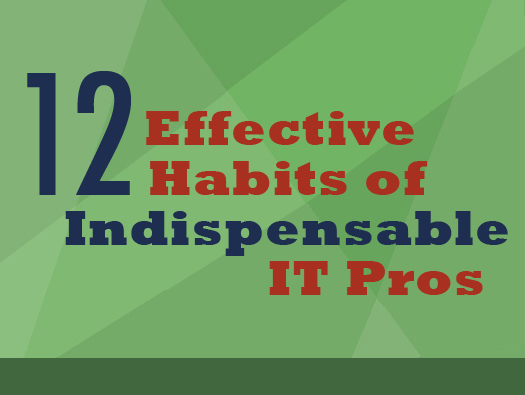12 effective habits of indispensable IT pros
How do you keep your job — or get a better one — in an era when hiring is slow and budgets are squeezed? Follow these 12 maxims.
Some are practical advice you’ve heard before (and ignored). Being familiar with how technology can improve the bottom line is more important than ever. But so is expanding your portfolio of IT skills. You’ll also want to reach out and communicate with your colleagues across the organization, and take on dirty jobs nobody else wants. Eventually it may even mean leaving the comfort of a big organization and branching out on your own.
But remember: Becoming “indispensable” can be a double-edged sword. Get too indispensable, and you might find yourself unable to move beyond your niche.

Effective IT habit No. 1: Get down to business
You may be your organization’s most talented developer or dedicated systems administrator, but if you don’t know what the business is selling or what service it’s providing, you’re an unemployment statistic waiting to happen.
First step: Learn as much about the business as you possibly can, advises Mark A. Gilmore, president and co-founder of Wired Integrations.
“Once you understand how the company works, you can use your IT knowledge to improve the company — thus making yourself more valuable and less dispensable,” Gilmore says.
“Don’t look at things from strictly an IT perspective,” he says. “Widen your vision to see how things relate to the business world around you. That will make you more valuable than 20 technical certifications and a master’s degree will.”
Effective IT habit No. 2: Keep your eye on the bottom line
Your job isn’t just to keep the data center humming. It’s to help your organization use technology to improve the business.
Servers running at a fraction of capacity? If you haven’t already virtualized, now’s the time. Software licenses dragging down your budget? An increasingly broad choice of low-cost cloud-based apps awaits.
“IT professionals need to focus on areas that either drive down costs, such as virtualization, cloud computing, and converged networking, or on areas that help to generate revenue, such as social media, mobile marketing, and SEO,” notes Rick Mancinelli, managing partner for Cloud Computing Concepts. “Ultimately, those IT professionals who have a positive impact on the bottom line will be the most valuable to their employer.”
Effective IT habit No. 3: Keep your head in the cloud
With many traditional IT functions moving to the cloud, your company may no longer need you to flip switches, connect cables, or troubleshoot machines. But they will still need someone who can tell them what services are available, which ones are worth looking at, and which ones they should avoid.
“If your organization plans to rely more on public cloud providers, especially for basic infrastructure needs, you may find you need fewer in-house operations people to maintain, patch, and upgrade systems,” says Mark White, CTO of Deloitte Consulting’s technology practice. “But you’ll still require people with expertise in managing a catalog of cloud services, handling subscribers, brokering agreements with cloud providers, and intervening when problems arise.”
Effective IT habit No. 4: Broaden your tech horizons
Besides mastering your own tech domains, broaden your skills to include other areas. If a crisis arises — and the people responsible aren’t available — you may be able to step and save the day.
“This helps employers view them as valuable team players who can easily branch out to handle other jobs,” says Dr. Issac Herskowitz, dean of the Graduate School of Technology at Touro College.
The easiest way to develop new skills (and impress your boss) is by volunteering to help other areas of IT and to stay on top of emerging tech trends, Herskowitz adds. The more you know about the latest and greatest, the more likely you’ll be invited to contribute when those technologies are being considered for adoption.
Effective IT habit No. 5: Teach your co-workers to speak geek
Want to break down the walls between IT and business and earn goodwill in the process? Start a series of casual teaching sessions where you bring less savvy co-workers up to speed about the latest in tech, suggests Ben Dunay, founder of Sixthree Technology Marketing.
“Even if you start small and informally over brown bags in the break room, it is a very cool way to step outside the norm and boost your career,” he says. “By making the technical terms clearer to the business people, you can quickly become the go-to guy for your boss when he needs something technical explained to save the day.”
Effective IT habit No. 6: Ditch the slackers, find a mentor
Hanging with a crew that likes to take long lunches and knock off at five (or earlier)? You’re not doing your career any good, says David Maxfield, author of “Change Anything: The New Science of Personal Success.”
“The habits that hold you back are likely enabled, tolerated, or encouraged by others,” he says. “Use positive peer pressure by surrounding yourself with hardworking friends who share your career goals. Distance yourself from the office slackers.”
Instead, Maxfield advises you seek someone with more experience to steer your career in a positive direction. “Find a trusted mentor,” he says. “That will help you navigate the career development opportunities that exist within the organization.”
Effective IT habit No. 7: Do it with data
If your business users aren’t drowning in data, they will be. Taming the data deluge will make you invaluable.
“IT people who can make sense of business data, safely store it, categorize it, and especially analyze it are highly valuable,” notes Scott Lever, a managing consultant with PA Consulting Group.
George Mathew, president and COO of Alteryx, predicts one of the hottest jobs in the future will be the “data artisan,” a hybrid role that mixes data analysis with business savvy. “Data artisans will be asked to pull from structured and unstructured sources to drive the most important decisions within an organization — like where it should open its next retail location, whether to pursue a new market, and which products to push,” he says.
Effective IT habit No. 8: Take on jobs no one else wants
Safe, predictable jobs won’t get you into trouble, but they won’t earn you any glory either. It’s the tough jobs where you can prove your value, says John Paul Engel, principal for Knowledge Capital Consulting.
“The best career advice I ever received was from then president of Citibank California who told me, ‘Look for the biggest problem and solve it because therein lies your greatest opportunity’,” he says.
Take on a project that’s already going well, the best you can hope for is that it will continue to go well. Take on something that’s a disaster and turn it around — even just a little better — and you get a reputation as somebody who gets things done, Engel adds.
Effective IT habit No. 9: Don’t be a jerk
You might be a brilliant coder, but if nobody likes you, your head is on the chopping block.
“Personality goes a long way when it comes time to make cuts in an organization,” notes Nathan Letourneau, director of marketing for PowerWise USA. “Companies prefer people with positive attitudes and a good work ethic, even if they aren’t as highly skilled as another. Don’t be a pain in the butt or overly negative. This isn’t to say you shouldn’t speak your mind, but just make sure you’re respectful when doing it.”
Managers like to get rid of the troublemakers and malcontents first, says Engel: “It’s the person that makes the work environment better that gets promoted and is the last to leave in a layoff.”
Effective IT habit No. 10: Go public
The more people who know and rely on you — especially outside your department or organization — the harder it is to fire you, notes Engel.
If you have a client-facing job, you’re less likely to feel the ax on your neck because companies don’t generally like to fire people who have relationships with key accounts, he says — provided, of course, you obey Rule No. 9.
If your job doesn’t bring you into regular contact with clients, you can strive to become well known across different departments, especially in larger, more siloed enterprises.
“Look for projects and opportunities that cut across departments because this builds your internal network — thus making you more valuable to the company,” he says.
Effective IT habit No. 11: Don’t become literally “indispensable”
Being indispensable can become a trap. Your talents can become so critical that you can never leave or rise to a new position within your company, says Steven A. Lowe, CEO of Innovator LLC.
“A friend of mine is an excellent developer who has created a few critical software systems for the company that employs him,” Lowe says. “No one else can step in and do what he does, and the company can’t ‘afford’ to promote him to a more senior position or pay him much more money. So he’s frustrated and miserable — but he’s certainly indispensable!”
Don’t hoard information or expertise. Delegate responsibility. Start training your own replacement now, or find ways to outsource responsibilities so you can take on more challenging assignments.
Effective IT habit No. 12: Know when to fire yourself
Sometimes the best way to become indispensible is to step away from a stifling career path, even if that means branching out on your own.
“I boosted my career by starting my own company,” says Innovator’s Lowe. “I doubled my take-home pay immediately, set my own hours, and got to work on really interesting things with highly motivated people.”
When you’re out on your own, being indispensable means solving problems and letting others reap the rewards, Lowe says. “That’s pretty much the essence of my consulting career. I innovate, they prosper, we both win. The next time the client has a challenge, they call me first.”
Best Microsoft MCTS Certification,
Microsoft MCITP Training at certkingdom.com













Leave a Reply